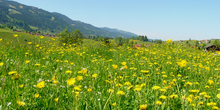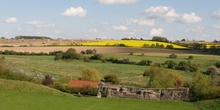Agriculture & Land Management
Our Work
Latest in Agriculture & Land Management
-
The PEGASUS project publishes its first Newsletter
Welcome to the first newsletter of the PEGASUS project! It provides information on the project’s progress to date and details on the 34 case studies currently underway in 10 EU countries examining how to ensure the improved delivery of public goods and ecosystem services in different farming and forestry situations.
-
Improving environmental financing via result-based agri-environment measures
A new article by IEEP explores the use of result-based agri-environment measures in the region of Baden-Württemberg, Germany. The study shows that result-based schemes can increase the environmental effectiveness and conditionality of the EU Common Agricultural Policy.
-
New PEGASUS website
Project website for EU research project PEGASUS goes live!
-
Result-based agri-environment measures: market-based instruments, incentives or rewards?
Result-based schemes are innovative agri-environment measures, which remunerate farmers only if they can demonstrate to have achieved the desired environmental goal. This is different from ...
-
EU research project PEGASUS - new thinking on sustainable land management
EU research project PEGASUS kicked off in London on 29-30 April. The three-year project, led by IEEP, is focused on transforming land management approaches in the EU to improve the delivery of public goods and ecosystem services from rural areas.
-
Evidence before ideology
The latest edition of IEEP's newsletter is now available. David Baldock argues that in 2015 solid evidence rather than political fashion will be required in scrutinising EU policy and economic performance. Also: fossil fuel subsidies; allocating fishing quota; and the launch of our new training programme.
-
Sustainable intensification of European agriculture
The concept of sustainable intensification has come into prominence in the context of global food security. This report defines what we mean by sustainable intensification, explains its global logic, discusses what it means for EU agriculture and exemplifies this in three case studies for soil performance, nutrient recycling and biodiversity.
-
Sectoral resource mobilisation to implement global biodiversity targets
There is an urgent need to find sufficient resources to enable developing countries to implement the global targets for biodiversity by 2020. Financing the conservation and sustainable use of biodiversity from different sectoral funding flows can complement global biodiversity financing.
-
Ecosystem services of boreal mires and peatlands in Finland
Mire ecosystems are well-known for their unique species and habitats of high conservation value and they also provide a range of benefits to our societies and economies. This publication outlines the results of a pioneering project that aimed to identify and valuate ecosystem services provided by pristine mires and managed peatlands in Finland.
-
Natural capital in a Nordic context
A report for the Nordic Council of Ministers reviewing five different approaches to natural capital accounting and exploring their links with biodiversity and ecosystems.
-
Incorporating biodiversity and ecosystem service values into national strategies and action plans
This guidance document has been prepared to support practitioners of National Biodiversity Strategies and Action Plans to update their plans to incorporate biodiversity and ecosystem service values. Six in depth country case studies provide common lessons of good practice.
-
Land as an Environmental Resource
How can we meet the different and often conflicting demands we make on our limited supply of rural land in Europe? A more strategic approach to the way in which land is used is needed than has been the case in the past. This report for DG Environment looks at the data, the challenges and the policy options for Europe.
-
Taking into account opportunity costs when assessing costs of biodiversity and ecosystem action
The study provides an estimate the costs of biodiversity action in the EU with special consideration of opportunity costs.
-
Valuing and Conserving Ecosystem Services: a Scoping Case Study in the Danube Basin
The report for WWF provides an assessment of the value and status of some key ecosystem services in the Danube Basin, and some policy instruments to support them.
Related
-

Debating the Future of The Common Agricultural Policy
The IEEP's platform to share thoughtful commentary and analysis on the future development of European agriculture and rural development policy.
Highlights
-

Result-based agri-environment measures: market-based instruments, incentives or rewards?
Result-based schemes are innovative agri-environment measures, which remunerate farmers only if they can demonstrate to have achieved the desired environmental goal. This is different from ...
-

Land as an Environmental Resource
How can we meet the different and often conflicting demands we make on our limited supply of rural land in Europe? A more strategic approach to the way in which land is used is needed than has been the case in the past. This report for DG Environment looks at the data, the challenges and the policy options for Europe.
